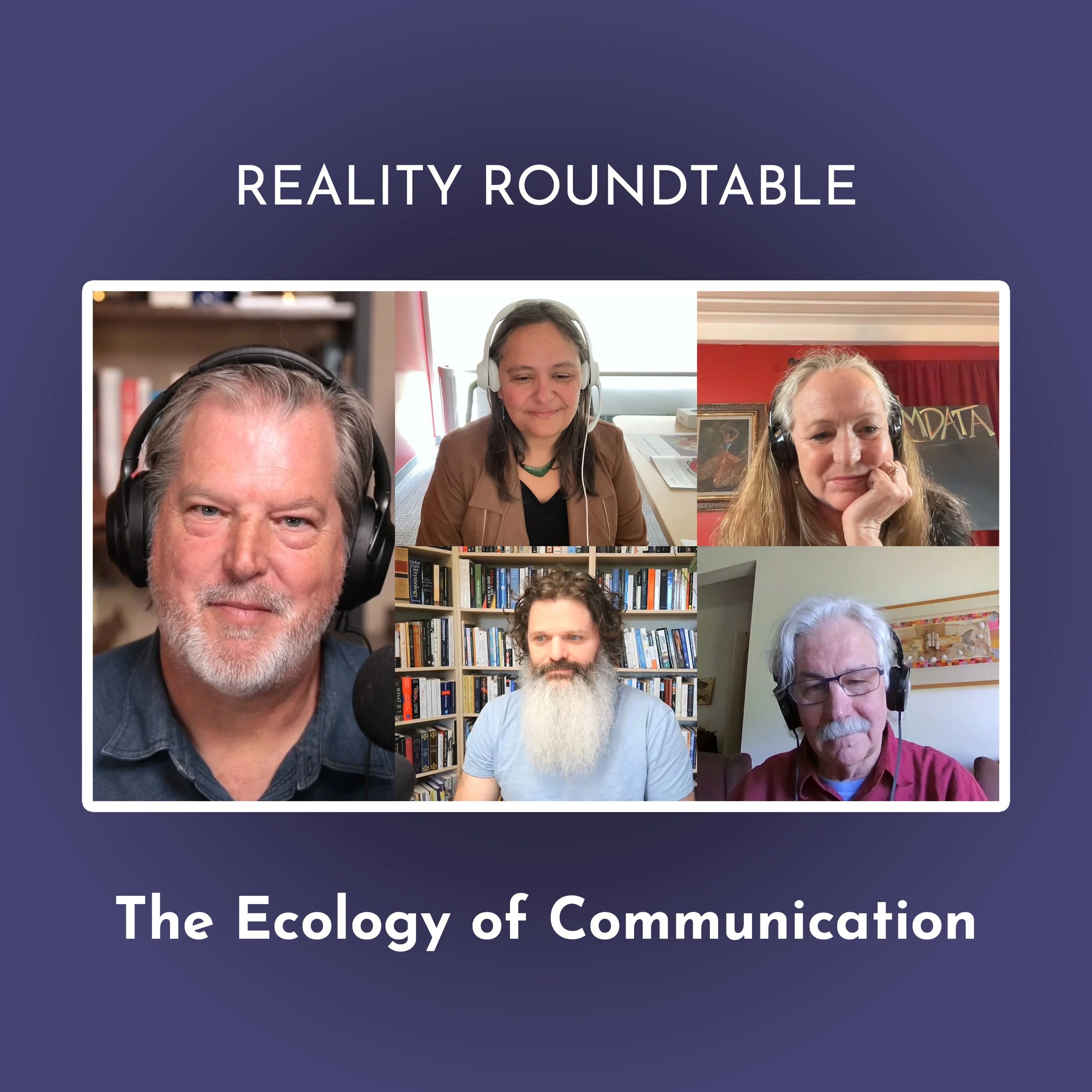The Ecology of Communication: Moving Beyond Polarization in Service of Life
Reality Roundtable 10
July 28th, 2024
(Conversation recorded on June 14th, 2024)
Show Summary
There’s a growing understanding of the need for biodiversity across ecosystems for a healthy and resilient biosphere. What if we applied the same principles to the way we communicate and use language to relate to each other and the world?
Today Nate is joined by Nora Bateson, Rex Weyler, Vanessa Andreotti, and Daniel Schmachtenberger to talk about the ecology of communication. This important conversation addresses some of the traps and pitfalls of modern relating, including the use of increasingly performative language and the erosion of authentic connection, both of which can leave us feeling isolated from one another. The panelists then offer ideas for how to shift from this axis of polarization into a space of mutual learning together, no matter how disparate each other’s views may seem at first glance.
What if we were to start conversations from a place of commonality, without choosing sides, to create more inquisitive exchanges that lead us to deeper insights about one another amidst a cacophonous world? Why is it crucial to consider the broader context in which conversations unfold - nestled within people, ideas, and cultures - in order to fully grasp the complexity of the relationships that connect us all? How would shifting the way we communicate help us ask the right questions about the species-level challenges we face, and better equip us to hear the answers?
About Nora Bateson
Nora Bateson is an award-winning filmmaker, writer and educator, as well as President of the International Bateson Institute, based in Sweden. Her work asks the question “How can we improve our perception of the complexity we live within, so we may improve our interaction with the world?”
An international lecturer, researcher and writer, Nora wrote, directed and produced the award-winning documentary, An Ecology of Mind, a portrait of her father, Gregory Bateson. Her work brings the fields of biology, cognition, art, anthropology, psychology, and information technology together into a study of the patterns in ecology of living systems. Her book, Small Arcs of Larger Circles, released by Triarchy Press, UK, 2016 is a revolutionary personal approach to the study of systems and complexity.
Find out more about Warm Data here: https://www.warmdata.life/
About Rex Weyler
Rex Weyler is a writer and ecologist. His books include Blood of the Land, a history of indigenous American nations, nominated for a Pulitzer Prize; Greenpeace: The Inside Story, a finalist for the BC Book Award and the Shaughnessy-Cohen Award for Political Writing; and The Jesus Sayings, a deconstruction of first century history, a finalist for the BC Book Award.
In the 1970s, Weyler was a cofounder of Greenpeace International and editor of the Greenpeace Chronicles. He served on campaigns to preserve rivers and forests, and to stop whaling, sealing, and toxic dumping. He currently posts the “Deep Green” column at the Greenpeace International website.
About Vanessa Andreotti
Vanessa de Oliveira Andreotti is the Dean of the Faculty of Education at the University of Victoria. She is a former Canada Research Chair in Race, Inequalities and Global Change and a former David Lam Chair in Critical Multicultural Education. Vanessa has more than 100 published articles in areas related to global and climate education. She has also worked extensively across sectors internationally in projects related to global justice, global citizenship, Indigenous knowledge systems and the climate and nature emergency. Vanessa is the author of Hospicing Modernity: Facing humanity's wrongs and the implications for social activism, one of the founders of the Gesturing Towards Decolonial Futures Arts/Research Collective and one of the designers of the course Facing Human Wrongs: Climate Complexity and Relational Accountability, available at UVic through Continuing Studies.
About Daniel Schmachtenberger
Daniel Schmachtenberger is a founding member of The Consilience Project, aimed at improving public sensemaking and dialogue. The throughline of his interests has to do with ways of improving the health and development of individuals and society, with a virtuous relationship between the two as a goal.
Towards these ends, he’s had a particular interest in catastrophic and existential risk, with focuses on civilization collapse and institutional decay. His work also includes an analysis of progress narratives, collective action problems, and social organization theories. These themes are all connected through close study of the relevant domains in philosophy and science.
Watch on YouTube
Show Notes & Links to Learn More
00:00 - Nora Bateson’s Warm Data and TGS Episode, Daniel Schmachtenberger’s + Bend Not Break series, Prior episode on Artificial Intelligence, Episode on Naive Progress, Rex Weyler’s Deep Green essays index and TGS Episode, Vanessa Andreotti’s, Hospicing Modernity and TGS Episode
11:57 - Monocultures
14:57 - Billions of dollars of investments into renewables, international climate meetings, yet carbon emissions have increased every year
17:31 - Warm Data Lab
22:40 - Heuristics
24:10 - The limits of English as a language
25:36 - Chief Ninawa
26:55 - David Bohm, Krishnamurti
28:19 - Greenpeace
28:52 - Nature’s boundaries are permeable
30:35 - Ubuntu
31:11 - People are different in different contexts
34:50 - How social media takes advantage of evolutionary psychology
39:39 - Social movements frequently get co-opted and twisted
43:02 - Bioneers
44:56 - Moiré Patterns
57:58 - Seek more to understand than to be understood
58:52 - Tao Te Ching
59:15 - Charles Sanders Peirce
1:00:21 - Dunning-Kruger Curve
1:11:12 - How do systems change
1:18:16 - Schismogenesis
1:22:41 - Anti-assholism Memo, Co-sensing with Radical Tenderness, 7 steps back and 7 steps forward (or aside), Radars I: learning to read and to be read
1:28:18 - Shen Ling
1:30:48 - The use of a tool matters towards its value
1:32:10 - Hegelian Communication, Facts can be weaponized
1:35:12 - Radical Kabbalah - Marc Gafni
1:35:36 - The desire of self is the cause of suffering
1:36:18 - The Consilience Project
1:38:48 - The Endgames of Bad Faith Communication - The Consilience Project
